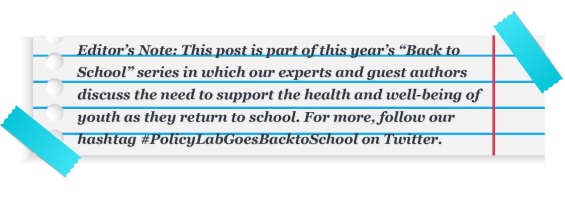The ABCs of School Readiness: Supporting Caregivers in Fostering Early Language Development

As back-to-school season approaches, many parents and educators are thinking about ways to foster school readiness in children who will soon return to classrooms. While this thought and preparation is important, preparation for later school success can actually begin much earlier, during infancy and toddlerhood. For example, did you know that language development at age 36 months predicts school success in reading and math at 3rd grade?
One key tool available for families to help prepare their young children for school is simple and affordable: conversation. A language-rich environment in the crucial developmental period between ages 0-3 can contribute to healthy brain growth and later school success. However, we know that many parents are juggling busy schedules and competing priorities, making it difficult to provide this support.
In this blog post, I’ll share more about our team’s ongoing research to empower parents as they seek to support language development in their young children.
Boosting Caregiver Conversations With Their Children
Based on our team’s forthcoming research among children in Philadelphia, we know that more than 80% of low-income toddlers were below average in receptive language development, which involves listening and comprehension, and 70% were below average for expressive language, which involves talking and communicating, compared to a national sample of 2-year-olds. Lags in language development can have a major impact, causing delays in school readiness, which can then lead to later academic struggles.
One promising intervention is a 10-week parent education and training program designed to empower parents to support language development in their young children ages 0-3. Known as LENA Start, the intervention involves group-based parent education as well as specific, individualized feedback on the amount of language children hear at home. Information about the number of words and conversations a child hears is collected using “Fitbit-style pedometer for words” technology one time per week and is shared with parents in feedback reports throughout the 10-week program period.
Source: https://www.lena.org/lena-start/
During weekly group meetings, parents meet with a trained coordinator to learn about early childhood language development. The meetings include interactive presentations, videos of real parents and children, group discussions and specific tips for talking more with young children. Parents who have done a recording using the “pedometer for words” technology review individualized reports that show when the conversations with their child occurred at home. This gives parents a chance to see the impact of their efforts to talk more with their child and decide on good times of day to chat with their child.
The focus is on increasing interactive talk, rather than simply encouraging the parent to talk more. This is an important distinction because this back-and-forth conversation between child and adult—known as a “conversational turn”—contributes more directly to brain growth and development than simply ensuring that the child hears a high volume of words.
What Can The Research Tell Us?
Currently, our team is conducting a randomized control trial to learn more about the efficacy of the LENA Start program. Our goal is to learn whether increases in parental speech and conversational turns are due primarily to the instructional group meetings, or if the feedback reports for parents are what lead families to increase interactive talk. We recruited individual families from Philadelphia and partnered with community agencies such as Catholic Social Services to use the LENA Start program in their parent groups.
While the weekly information reports from the recordings are powerful motivators for parents, this aspect of the program is costly and may not be a sustainable expense for most community agencies. If the same increases can be gained with fewer recordings, the benefits might be more widely distributed.
Continued research can support those who work with caregivers and their children to choose the most effective and cost-efficient interventions to encourage language through conversation at home. But in the meantime, the evidence is clear that promoting an early environment rich in language and conversational turns is crucial for school readiness.
Danielle Collins is a former clinical research coordinator at PolicyLab.

